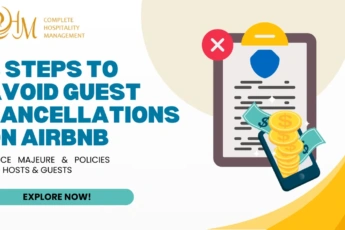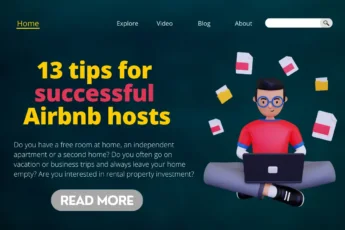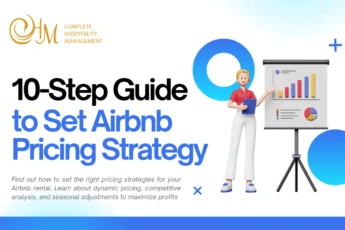A Direct Booking Website for Vacation Rental – Advantages, Structure & Common Mistakes 2025
Every property owner or manager knows that a direct booking website for your business is one of the keys to success in the sector. Although ads in online travel agencies are a good way to start, a quality website will allow you to increase your online visibility, boost your direct bookings, and give your guests extra confidence.
Your online presence is easy. To allow you to take full advantage of this type of software, we have prepared this guide in which you will discover everything you need to know about the pros, structure, and most common mistakes of your vacation rental website and the benefits it can bring you. Read on to discover them!

Direct booking website for your vacation rental business
Advantages of creating a direct booking
website for your vacation rental
Knowing how to make a good vacation rental website has multiple benefits, which will allow you to increase the profitability of your business and stand out from the competition. In this section, we tell you the 5 most important ones.
1. Receive direct bookings from clients
It is one of the most important reasons why it is advantageous to create your own direct vacation rental website. This way, you and your guests can forget about the expensive commissions of property rental platforms. This saving will allow you to increase your competitiveness in the market.

Direct communication with clients with a direct booking website
Direct bookings have been gaining popularity in recent years. This type of reservation is in full growth and already exceeds in volume those made through some vacation rental platforms such as Airbnb, VRBO, Booking.com, etc.
Many travelers prefer to book directly through their property website, aware of the savings in commissions that this entails. In an increasingly competitive sector, having a website for your vacation rental can mean the difference between whether a potential guest books your accommodation or not.
2. Improve your presence on the Internet
Owning a website is essential when it comes to earning a good reputation on the Internet, and that is that when we find a business without a website, the first thing that comes to mind is that it should not be very professional. Remember of this mentality and apply it to your tourist rental business.
It’s no secret that guests love to browse vacation rental platforms and then search for their most liked properties on Google. The reason? Get an idea of the business’s credibility and get a better price.

Improving your presence on the Internet with a direct booking website
Type the name of your property on Airbnb and then in Google. Do you show up? Users who love to search for references to everything will consider your property verifiable if they can find it outside of the vacation rental platforms. Plus, savvy guests will also look for better prices with direct bookings. Therefore, you will get more credibility and reservations.
Think of your website as your business card: if someone is interested in your property, what URL would you give them? Do you really want to send it to a vacation rental platform ad?
The short answer is no. A website is essential for any owner looking to improve their online visibility and credibility.
3. Boost your vacation rental brand on the Internet
Popular vacation rentals platforms like Airbnb, Booking.com, and Vrbo are convenient choices, but they may limit your brand recognition. Your property can get lost among thousands of listings on these platforms, as guests identify more with the platform’s brand than yours.
Having your own website will give an air of professionalism to your business that you will not be able to achieve in any other way. Not only that, but it will also give you more “branding” options than an Airbnb listing.
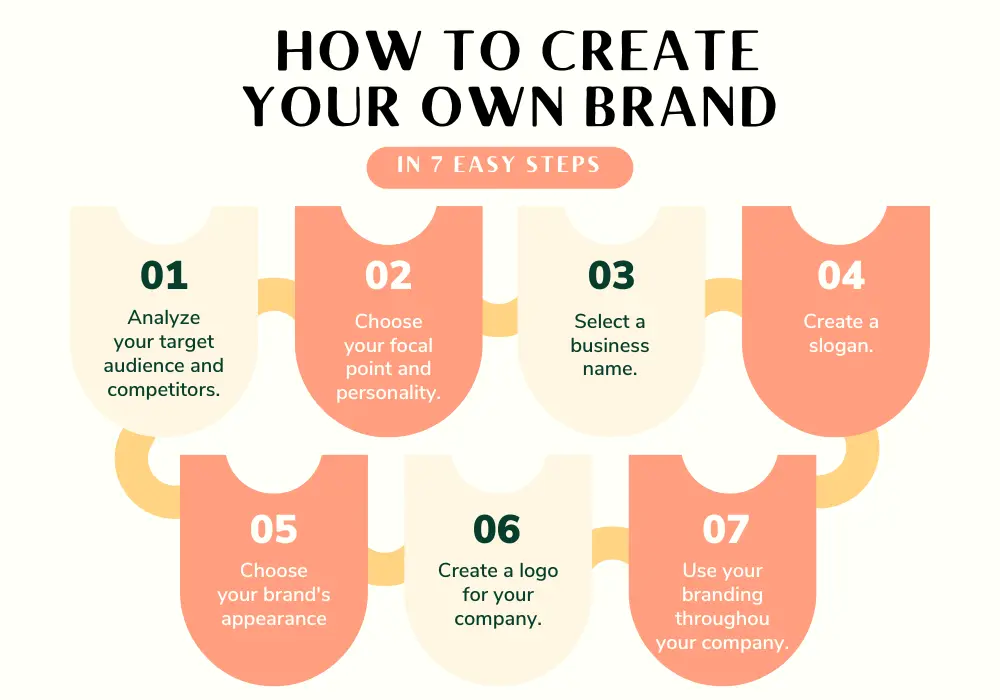
Process of branding of the booking website for vacation rentals
But what do we mean by “create a brand”?
We are talking about showing your logo without limitations, choosing the colors and typography you prefer, and showing as many photographs as you want… A strong brand will help potential guests see your vacation rental as more than a place to stay.
4. Become independent from vacation rental platforms
Such platforms are convenient for getting bookings and gaining visibility, but they have high commissions. On average, it is 15-30% of the total amount. This affects not only the owner, who see their margins shrink but also the guests, who must pay more for their stay.
With its popularity on the rise, it does not seem that the platforms will lower their commissions soon. But having your own website for your rental will allow you to stop depending on these platforms and avoid being at their mercy.
5. Take better control of your rental business
Creating a vacation rental website has advantages beyond saving commissions and not depending on online platforms. Above all, having your own website will allow you to have much more freedom when it comes to managing your business.
Do you want more photographs? Do you want the name of your accommodation to appear very large? No problem! We can create for you a direct booking website and you will be able to control your content 100%, without restrictions that limit you when making decisions.
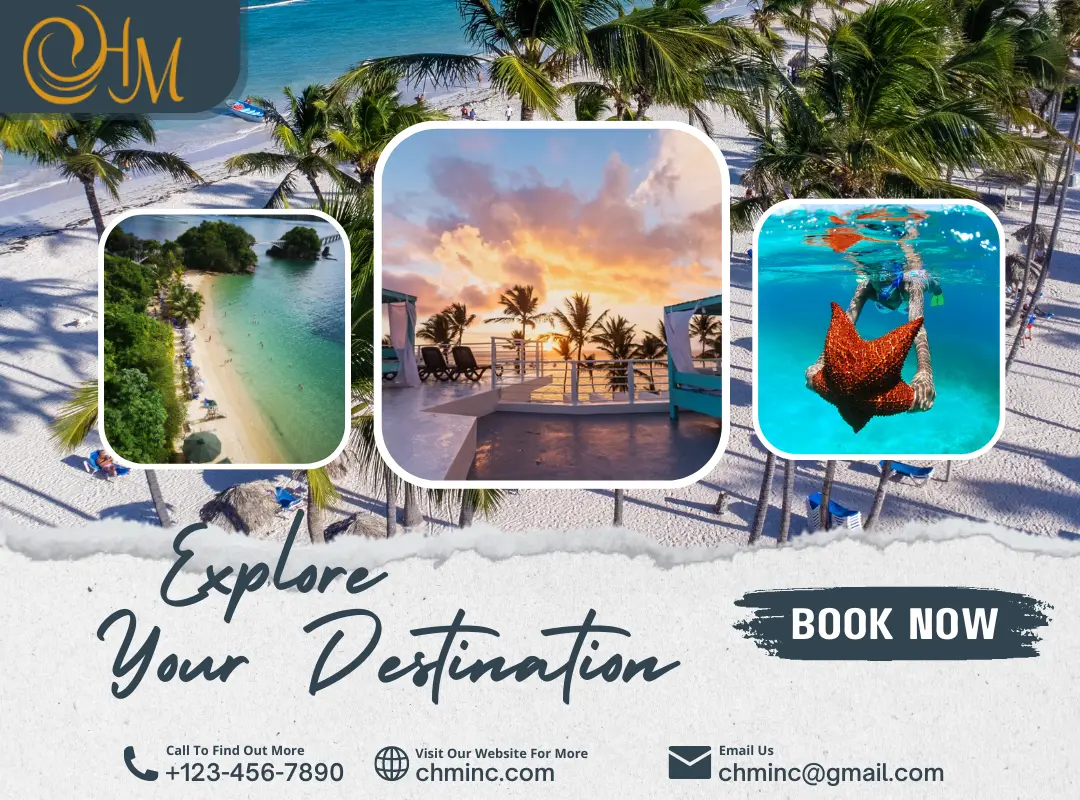
Direct booking website as a way to control business completely
Suppose you advertised your property online for a while. In that case, you probably know that vacation rental platforms tend to impose character limits and a maximum number of images in their listings. With your own page, however, you will be the only person in charge of the rules.
It means you will be able to display all the opinions, tips, local recommendations, blog articles, 5-star services, and special promotions you want without limitations!
What your direct booking website
for vacation rental should include
A website is a perfect showcase for vacation rental properties that, however, is too often missed by owners who think that it is enough to create it to make it work.
Don’t make that mistake! A website must include a series of key elements if you want it to be successful and allow you to get direct bookings. Read on to meet them.
Choose a simple domain for your website
The domain name is the first and most basic thing you must decide before creating your hosting website. It is a key element of your brand, so you must choose it carefully. Now, how to make sure you make a good choice?
- Use an appropriate extension (.com, .es);
- Don’t be generic: introduce your brand;
- Keep it short and sweet;
- Ensure it’s easy to remember and write;
- Avoid hyphens, numbers, and symbols.
Create a memorable and bright logo
An attractive logo is a crucial piece of the puzzle to create a website for your tourist home. The logo is the visual representation of your brand, and as a general rule, it is what visitors to your page will remember most easily.
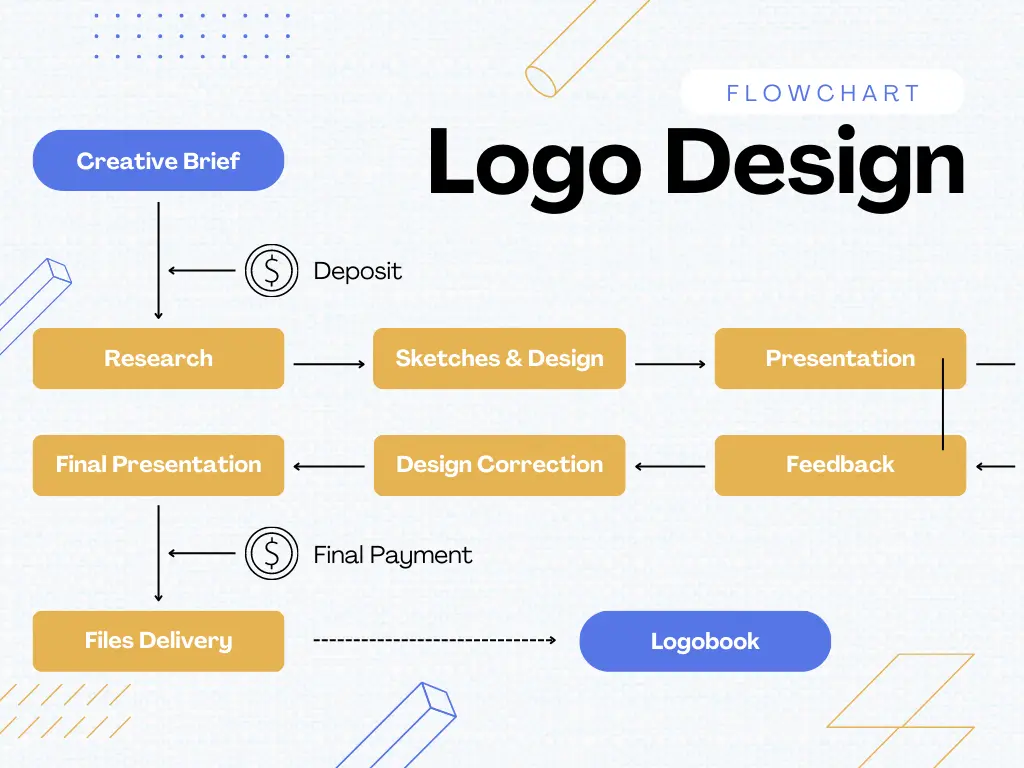
Steps of logo creation for your rental business
For example, consider social networks like Facebook, Twitter, or Instagram. Would you be able to draw their logo from memory? Probably, yes: they are unique and easy-to-remember logos; they are simple but iconic simultaneously.
Importance of branding of your rental business
The domain and the logo are two essential elements for “creating a brand” with your website, but they are not the only ones. You use fonts, colors, images, and the “voice” to address your potential guests…
The ability to control all of these aspects sets websites apart from vacation rental platforms. Suppose you want a direct booking website of any complexity with 24/7 support. In that case, you can address our team of professionals from CHM Inc., and we will provide you with the best website for your vacation rental business!
Right Hero title and Hero image
When entering a web page, you should first come across the Hero Title and Hero Image, the main title and image, whose purpose is to convince the potential guest from the moment they look at it.
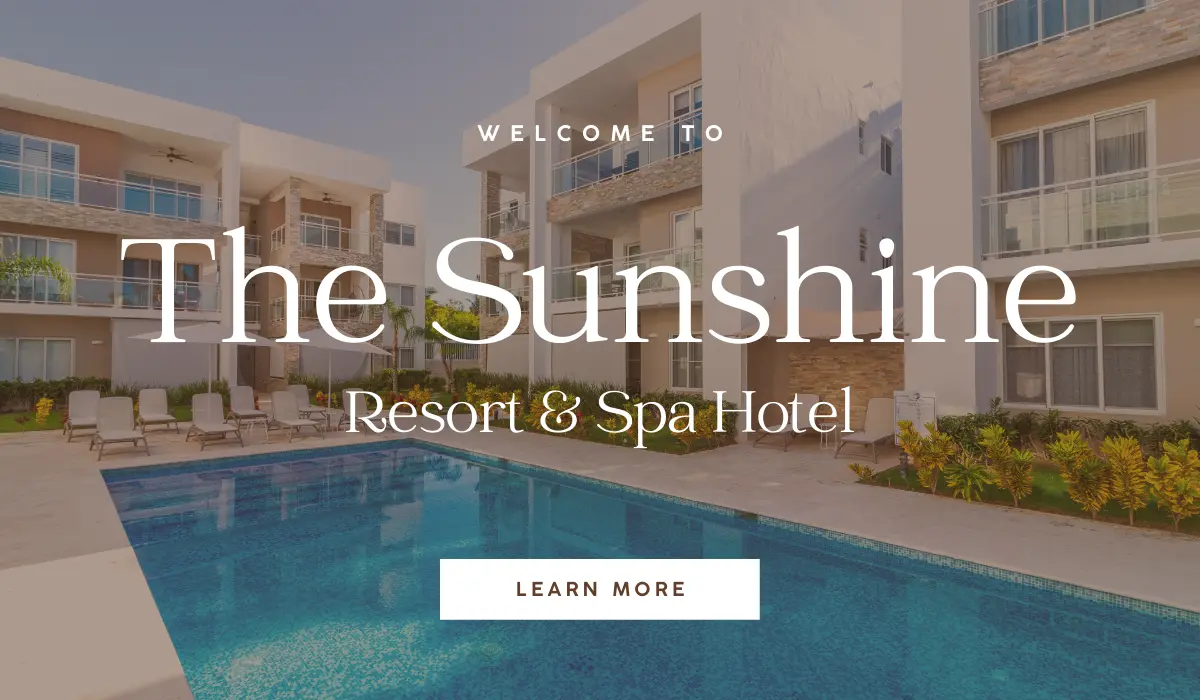
Example of the first page of the booking website for vacation rentals
The Hero Image can be one or more images that appear on the main page and show your property in all its glory. If you accompany this with a compelling Hero Title and include a call to action, your chances of getting bookings through your website will increase substantially.
Why not show your website visitors a booking widget that allows them to book directly from the home page? The first impression is essential, so take advantage of it!
Create a unique selling proposition (USP)
A unique feature of a USP makes a product or service stand out. The USP of your listing will be what sets it apart from the rest and makes potential guests decide on it. Put yourself in your client’s shoes: why should they choose your rental and not another?
A good web page will show all its visitors this USP, very large and on the front page. In this case, the product is a home, so showing its highlights on the home page and accompanied by high-definition photos will increase the chances that your website visitors will book your property.
The thing about great call to action
The call to action is called CTA, an acronym for Call To Action. A good call to action will make your website visitors go beyond browsing and take measurable actions on your page, such as making a reservation or subscribing to your newsletter.
Choosing the right words: effective and ineffective CTAs for vacation rentals
| Right | Wrong |
|---|---|
| “Book Now and Save 20% on Your Dream Vacation!” | “Maybe Book Later If You Feel Like It” |
| “Limited Availability! Reserve Your Stay Today!” | “You Can Book Whenever You Want” |
| “Secure Your Vacation Rental in Just 3 Easy Steps!” | “We Don’t Really Care When You Book” |
| “Get Instant Confirmation. Book Your Dates Now!” | “Maybe Book, Maybe Not. We Don’t Mind Either Way” |
| “Unlock Exclusive Deals by Booking Directly!” | “Booking Directly? Eh, Doesn’t Really Matter, Does It?” |
| “Plan Your Perfect Getaway. Reserve Now!” | “Book Whenever You Get Around to It. No Rush!” |
| “Limited Time Offer! Book Today for Best Rates!” | “Book Whenever. Rates Never Change, So It Doesn’t Really Matter” |
The CTAs should focus on incentivizing the reservations of your potential guests. Don’t let travelers go to OTAs: make it clear to them that you accept direct bookings and online payments with, for example, a button that says “Book now”.
Process of creation of promotions for a booking website
Promos are one of the most powerful tools to increase your bookings. If you offer a 10% discount or 4 nights for the price of 3, ensure these are listed on the home page of the website. Here’re 8 instances:
- “Summer Savings Spectacular: Book Now and Enjoy Up to 40% Off on Beachfront Getaways!”
- “Weekday Wellness Retreat: Unwind with 20% Off on Bookings from Monday to Thursday”
- “Winter Wonderland Special: Snuggle up and Save 25% on Cozy Cabins and Chalets”
- “Romantic Escape Package: Surprise Your Loved One with Champagne and a Complimentary Upgrade”
- “Spring Break Bonanza: Book 5 Nights and Get the 6th Night Free at Select Destinations”
- “Adventure Seekers Offer: Enjoy 15% Off on Exciting Outdoor Activities with Your Booking”
- “Honeymoon Bliss: Newlyweds Receive a Free Couples Massage and Chocolates”
- “Frequent Traveler Rewards: Earn Points for Every Booking and Redeem for Future Discounts”
How else are your potential guests going to find out? Promotions can sway even the most indecisive travelers, so don’t forget to make room for them on your page!
Take into account your guests experiences
Who has never opted for a product or service based on the recommendation of another person? Personal experiences and word of mouth are the best ways to promote your property and encourage bookings.
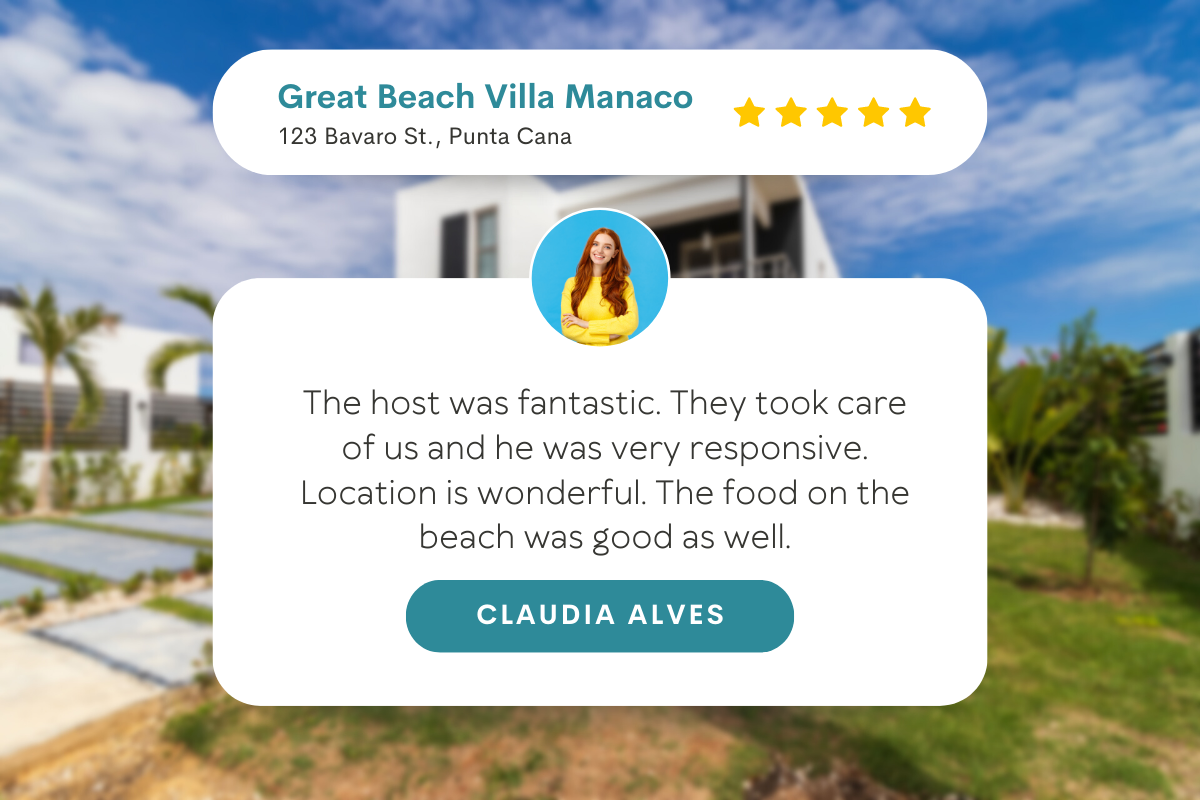
Importance of reviews for your direct booking website
You can take advantage of it by adding positive comments from your clients to your content or even creating a specific section to collect the best experiences. Think about it: a story in which a guest describes how fantastic their stay was, can convince more than one person to book!
Get external reviews from vacation rentals platforms
If you want to add extra legitimacy and trust to your website, don’t limit yourself to counting the most brilliant experiences: add a section in which the reviews of the platforms where you have advertised your property appear.
Sounds difficult? Well, it’s not. With our web-development service, you can easily import your reviews, for example, from Airbnb! Travelers love reading them, and displaying them on your website will allow you to back up your content with real, unfiltered reviews.
Obtain seals and certifications
A great way to build credibility for your business is to ensure that the certifications you’ve earned are prominently displayed on your website. If you’re an Airbnb Superhost or have earned TripAdvisor’s Certificate of Excellence, why not show it off to the world?
Elevating trustworthiness: 10 essential seals and certifications for vacation rental websites
| Seal/Certification | Description |
|---|---|
| SSL Secure | Indicates that the website has a secure sockets layer (SSL) certificate for secure browsing. |
| PCI-DSS Compliance | Demonstrates compliance with Payment Card Industry Data Security Standard (PCI-DSS) |
| TRUSTe Certified Privacy | Certifies that the website follows privacy best practices and protects user information. |
| TripAdvisor Certificate of Excellence | Recognizes exceptional hospitality and positive guest reviews on TripAdvisor. |
| BBB Accredited Business | Indicates accreditation by the Better Business Bureau, signifying ethical business practices. |
| Vrbo Premier Partner | Designates a trusted partnership with Vrbo, a prominent vacation rental marketplace. |
| Green Key Certification | Demonstrates the property’s commitment to environmentally sustainable practices. |
| Superhost on Airbnb | Recognizes hosts on Airbnb with a track record of excellent guest experiences. |
| Direct Booking Guarantee | Assures customers of the best rates, exclusive offers, and direct support when booking. |
| Verified Guest Reviews | Displays authentic reviews from verified guests to build trust and transparency. |
Arrive at the website of a vacation rental that has caught your attention, and you find stamps of the style on the main page. You will know you are dealing with a serious and reputable business. What more could you want?
Mention by press, journalists, and partners
Have you been featured in the press or associated with a local business? Don’t hesitate to add their logos on your website and a link to the article or the business website. This content is a form of social proof, a phenomenon whereby we view a business more positively when we know that other people hold it in high regard.
One of the key advantages of your own website is building your vacation rental brand; it would be pointless not to take advantage of the positive recognition from the press and businesses in the area!
Footers of your direct booking website
Footers are an often-overlooked part of web pages, and yet they couldn’t be more important. Take advantage of this space to include your contact information (company name, address, telephone…) and links to your social networks:
- “© Year, Your Company. All rights reserved. | Privacy Policy | Terms of Use | Sitemap”
- “Book with Confidence | Secure Payment | Trusted Partners | Verified Reviews”
- “Explore Our Properties | Special Offers | About Us | Contact Us”
- “Connect with Us | Follow Us on Social Media for Updates and Exclusive Deals”
- “Need Help? Our Customer Support Team is Available 24/7. Contact Us”
In this way, you will make it easier for your guests to communicate with you, and you will give a greater image of professionalism, but it is also very good for improving your SEO positioning at a local level.
The most common mistakes when creating
a direct booking website
Too often, vacation rental owners make a series of easily avoidable mistakes when building their accommodation website. Don’t become one of them! Read the following paragraphs to find out how to avoid committing them.
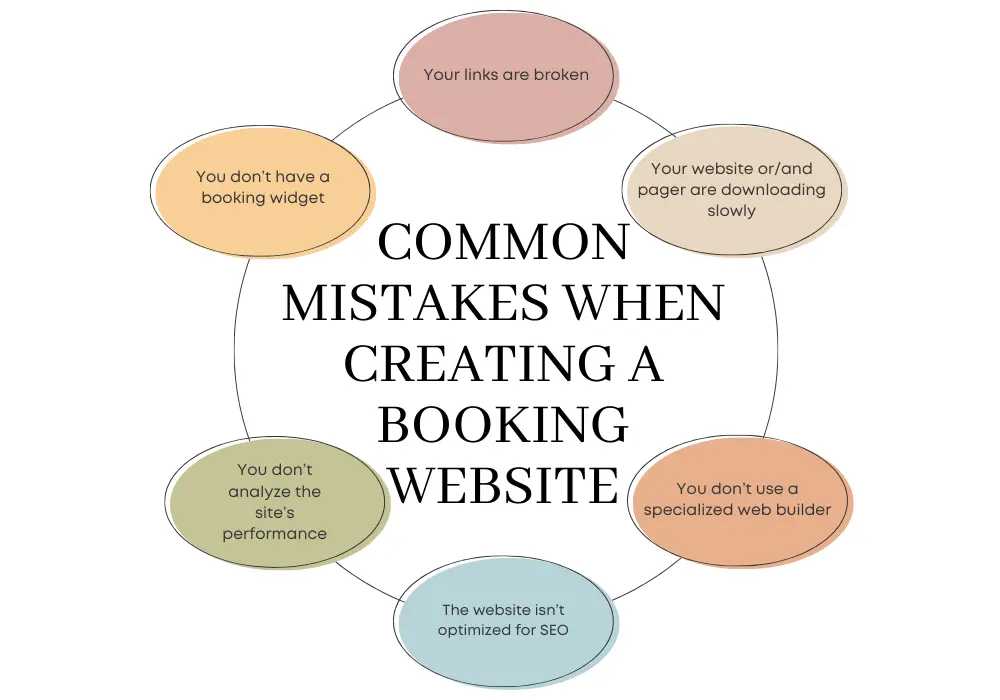
The most common mistakes when creating a direct booking website
You don’t have a booking widget
Do you remember CTAs? Think about what good they would do if you don’t have an easy way for potential guests to book your place. A common mistake is that the booking button on the web is smaller than other less important ones, but in some cases, there is not even a way to book without having to call!
Reservation widgets solve this problem: attractive and easy to integrate into any web page, these elements will allow you to accept reservations and payments over the Internet without major complications.
Your links are broken
Does the famous “404 error” ring a bell? This code is returned by web pages when the link does not exist for whatever reason.
Normally, it’s not that the page doesn’t exist, but that the link was misspelled, but the damage is the same. Imagine having a broken link on your home page’s “Book Now” button! Be sure to follow these tips to avoid broken links:
- Do not use punctuation marks at the end of links;
- Preview your pages before publishing;
- Check the links (you can use tools like Ahrefs).
A solid and robust web page is the first step to prevent broken links, so following these tips in the letter will help you greatly.
Your website or/and pager are downloading slowly
The Internet moves very fast, and if your website users have to wait more than a few seconds for your website to load, they will most likely give up and go with the competition.
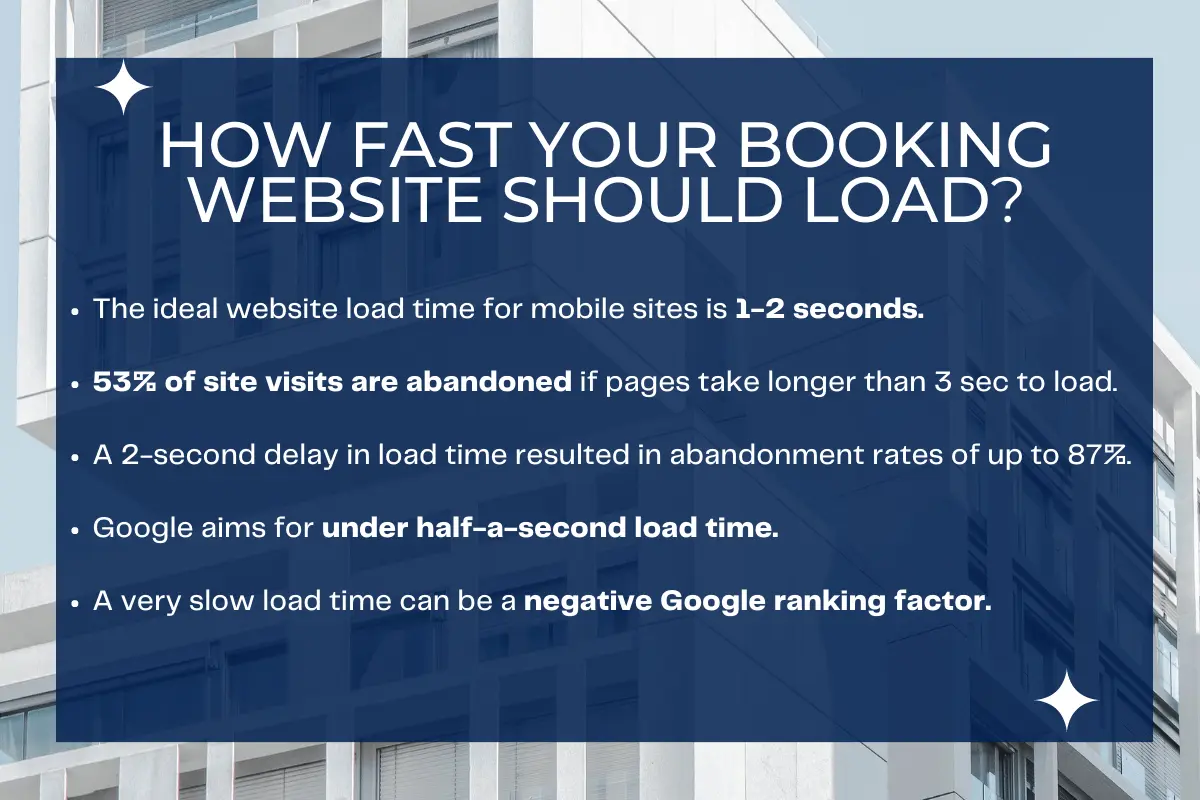
How fast a direct booking website should load
Make sure your website is fast and functional, or risk losing reservations you already had!
You don’t use a specialized web builder
Software explicitly designed with vacation rentals in mind will give you the tools to create a modern and functional website that is a pleasure to use for both you and your potential guests.
Reservation system, integration with payment platforms, real-time connection with vacation rental platforms such as Airbnb, Booking.com, or Vrbo. How much would it cost to do all this from scratch and without fail?
Unless you’re a true tech guru, using a service of complex web development designed by and for vacation rentals is the easiest way to have a professional-quality website.
The website isn’t optimized for SEO
Travelers often go directly to Google and type something like “Punta Cana rentals”. Very few people will search for your rental directly by name, at least at first.
How to increase the chances that your web page appears among the results every time someone searches for that? The answer is in SEO: the optimization of search results. It can be difficult, but at least avoid making the most common mistakes with our vacation rental SEO tips.
You don’t analyze the site’s performance
You never know… You may have followed the best advice and avoided falling into the most common mistakes, and still your website does not finish working. Creating a website is a process; the best way to improve your page is to understand what works and what doesn’t. Amond indicators to analyze are:
- Website Traffic
- Conversion Rate
- Bounce Rate
- Average Session Duration
- Page Load Time
- Exit Pages
- Search Engine Rankings
- ROI (Return on Investment)
- Mobile Responsiveness
- Social Media Engagement
- Click-Through Rate (CTR)
- Customer Lifetime Value (CLV)
Web analytics tools such as Google Analytics will allow you to get an idea of the performance of your website, so that you know what is the most interesting to visitors, where they come from, and how much time they spend on your website.
Conclusion
A lot of vacation rental owners tend to be intimidated by the idea of creating a website from scratch for their accommodation. However, our guide shows you no longer have to fear this process today.
What are you waiting for? Follow this link and enjoy having your vacation rental website ready to receive direct reservations!
Frequently asked questions about
direct booking website
1. What is direct website booking?
Direct website booking refers to the process of making a reservation or booking directly through a hotel or business’s official website without third-party platforms. It allows to access the hotel’s or business’s website, browse available options, select their desired dates, rooms, or services, and complete the booking process directly on the website.
By booking directly, customers can potentially enjoy benefits such as better prices, exclusive promotions, loyalty rewards, and a direct line of communication with the hotel or business.
2. How do I advertise my direct booking website?
To advertise your direct booking website:
- Optimize your website for search engines (SEO).
- Use pay-per-click (PPC) advertising.
- Leverage social media marketing.
- Implement email marketing campaigns.
- Work along with bloggers who specialize in travel.
- Create intriguing material that you can share.
- Maintain a presence on online travel agencies (OTAs).
- Create consumer referral programs.
- Seek partnerships and cross-promotion opportunities.
- Make the website user-friendly and mobile-responsive.
To make data-driven decisions and continuously improve your campaigns, don’t forget to track and analyze the performance of your advertising efforts utilizing web analytics tools.
3. What is the best site to make a booking website?
You can use several platforms. Your demands and tastes will determine the best choice for you. For example:
- WordPress is a flexible content management system that can improve its capabilities using booking plugins. With their help, you may give your website booking capabilities.
- Wix is a website builder that provides themes and options appropriate for booking websites. It has integrated booking systems, a drag-and-drop interface, and designs that can be customized.
- Squarespace is another popular website builder known for its modern and visually appealing templates. It offers various customization options and integrates with third-party booking services like Acuity Scheduling and OpenTable.
- Shopify can also be used to create booking websites. You can use apps like BookThatApp or Appointedd to add booking functionality to your Shopify store.
- Joomla is one more open-source content management system that allows you to create a booking website. Extensions like Solidres, Jomres, or VikBooking can be added to Joomla to enable booking capabilities.
When deciding which platform is appropriate for your booking website, take into account your unique requirements, financial situation, level of technical experience, and aesthetic preferences. Each of these platforms has pros and cons.
4. What is direct booking on Airbnb?
Without using Airbnb’s booking engine, direct booking on the site enables guests to book directly with hosts. Bypassing some of Airbnb’s protections and assurances, it entails direct communication and bargaining between hosts and guests.
5. What is an example of a direct booking?
When a traveler goes to a hotel’s official website, chooses the dates, amenities, and type of accommodation they want, and then makes the reservation directly through the hotel’s website, it is an example of a direct booking. As a result, there is no need for third-party websites or travel agencies because the reservation is made directly with the hotel.
6. Why is direct booking better?
Direct booking is preferred due to its many benefits:
- Cost savings. Direct bookings frequently offer more affordable rates and special offers than third-party booking websites. By avoiding intermediary commission costs, travelers can make financial savings on their bookings.
- Direct communication. People can communicate specific needs, make particular requests, or ask for support. It might lead to a more fulfilling and personalized experience.
- Flexibility and customization depend on the hotel’s location, bed style, or other facilities. Third-party platforms might not always provide it.
- Upgrades and special treatment as a gesture of appreciation. These extras could include room upgrades, free breakfast, spa discounts, or other exclusive amenities.
- Direct support and accountability in case of any issues or changes to the reservation. This leads to quicker resolution of problems and a more accountable customer service experience.
- Access to insider information such as local attractions, nearby events, or exclusive experiences the hotel or business offers. Such insights can enhance the overall travel experience and provide a deeper connection with the destination.
Nevertheless, direct bookings aren’t always the best option. Such factors as the hotel’s or business’s reputation, availability, competitive rates, and specific trip needs and preferences should be considered by travelers.
7. Can you advertise direct booking on Airbnb?
Airbnb does not provide an opportunity to advertise their booking websites or other external platforms on Airbnb. Airbnb’s terms of service require hosts to complete bookings through their platform and discourage the promotion of external booking channels.
Familiarize yourself with Airbnb’s policies and guidelines to ensure compliance and avoid potential violations. It’s always recommended to communicate and complete bookings within Airbnb’s platform to maintain the protections and support of Airbnb.
8. How do I create an online booking system?
To create an online booking system, follow these steps:
- Define your requirements;
- Choose a platform;
- Set up user accounts;
- Design the user interface;
- Implement booking functionality;
- Integrate payment processing;
- Implement notifications;
- Develop an administrative dashboard;
- Test and debug;
- Launch and promote.
Consider security and data privacy throughout development by implementing encryption, secure data storage, and compliance with relevant regulations (e.g., GDPR).
9. Can I make my own booking app?
Yes, you can make your own booking app. Here’s a simplified overview of the steps involved:
- Set up requirements;
- Choose a development approach;
- Design the user interface;
- Develop the app’s functionality;
- Implement user authentication;
- Integrate with external services;
- Test and debug;
- Publish your app;
- Maintain and update;
- Implement analytics and monitoring.
Developing a booking app can be a complex process, requiring expertise in mobile app development and possibly the assistance of professional developers if you lack the necessary skills.
10. How much does it cost to create a booking system?
The price of building a booking system might vary based on the system’s size and complexity, the strategy taken during creation, technical specifications, design considerations, available resources, and continuing maintenance. You can consult with our professionals to get accurate cost estimates based on your specific project requirements.
11. What is an example of an indirect booking?
Booking a hotel through an online travel agency (OTA) like Booking.com, Expedia, Airbnb, or Agoda is an illustration of an indirect booking. In this scenario, searching for available lodging, evaluating costs, and making reservations all take place on the OTA’s website or mobile application.
The OTA acts as a go-between for you and the hotel, making the booking procedure easier. The OTA may get remuneration and may charge a commission or fee for its services.
12. Do hotels prefer direct booking?
Yes, hotels generally prefer direct bookings to indirect ones since the former offer greater flexibility, better brand management, data ownership, and stronger customer interactions. Hotels can use OTAs to simplify their activities. The preference for direct reservations may vary depending on the hotel’s specific conditions and business strategy.
13. What are the two types of booking?
As of now, there are two of the most used types of bookings:
- Direct bookings include direct communication with a service provider. You can accomplish this by visiting the provider’s website, contacting them via phone or email, or going in person.
- Indirect bookings are bookings made through middlemen or outside websites. These intermediaries include online travel agencies (OTAs), tour operators, travel brokers, and aggregators. Indirect bookings often include searching for and making reservations using the intermediary’s platform or website.
Both direct and indirect bookings have their advantages and considerations. The choice between the two types of bookings depends on personal preferences, specific requirements, and the nature of the service being booked.
Updated on: . Author:




